Criminal Justice: Stages, Stakeholders, Effectiveness Analysis Report
VerifiedAdded on 2023/01/12
|8
|2291
|66
Report
AI Summary
This report provides a comprehensive analysis of the criminal justice process, starting with an introduction to law and legal systems. It delves into the main stages of the criminal justice process, outlining key steps such as reporting, investigation, arrest, prosecution, trial, and sentencing. The report then explores the roles and collaborative efforts of various stakeholders, including the police and the courts, in delivering justice. Furthermore, it outlines and explores different methods for measuring the effectiveness of the criminal justice process, particularly focusing on the UK context. The report evaluates stakeholder effectiveness in reducing reoffending using specific case studies, such as the case of Mr. Anderson, highlighting the importance of rehabilitation and strict initial punishments. The conclusion emphasizes the crucial role of the criminal justice system in maintaining societal standards and reducing crime rates, underscoring the impact of stakeholder efforts in fostering positive changes and reducing reoffending cases.
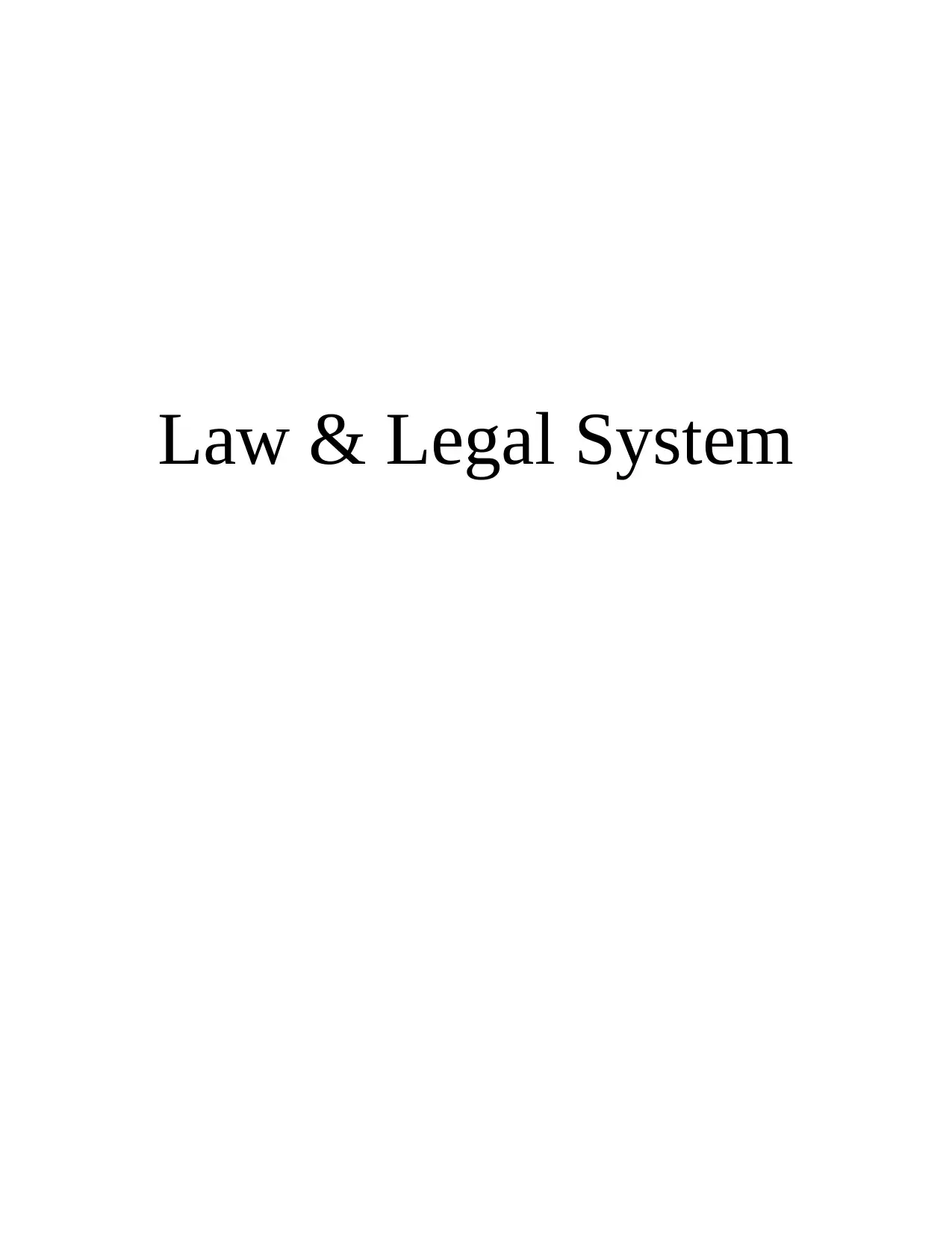
Law & Legal System
Paraphrase This Document
Need a fresh take? Get an instant paraphrase of this document with our AI Paraphraser
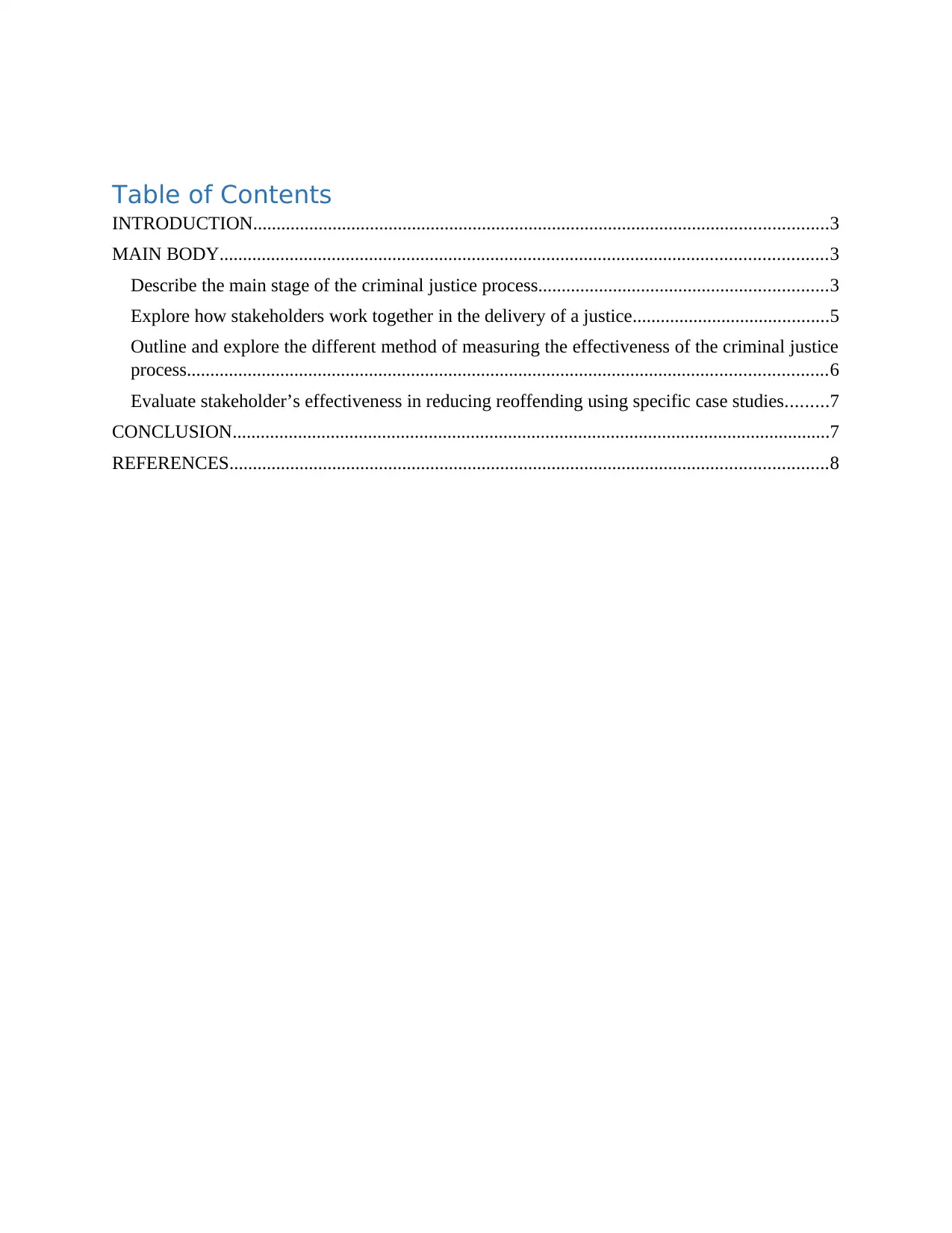
Table of Contents
INTRODUCTION...........................................................................................................................3
MAIN BODY..................................................................................................................................3
Describe the main stage of the criminal justice process..............................................................3
Explore how stakeholders work together in the delivery of a justice..........................................5
Outline and explore the different method of measuring the effectiveness of the criminal justice
process.........................................................................................................................................6
Evaluate stakeholder’s effectiveness in reducing reoffending using specific case studies.........7
CONCLUSION................................................................................................................................7
REFERENCES................................................................................................................................8
INTRODUCTION...........................................................................................................................3
MAIN BODY..................................................................................................................................3
Describe the main stage of the criminal justice process..............................................................3
Explore how stakeholders work together in the delivery of a justice..........................................5
Outline and explore the different method of measuring the effectiveness of the criminal justice
process.........................................................................................................................................6
Evaluate stakeholder’s effectiveness in reducing reoffending using specific case studies.........7
CONCLUSION................................................................................................................................7
REFERENCES................................................................................................................................8
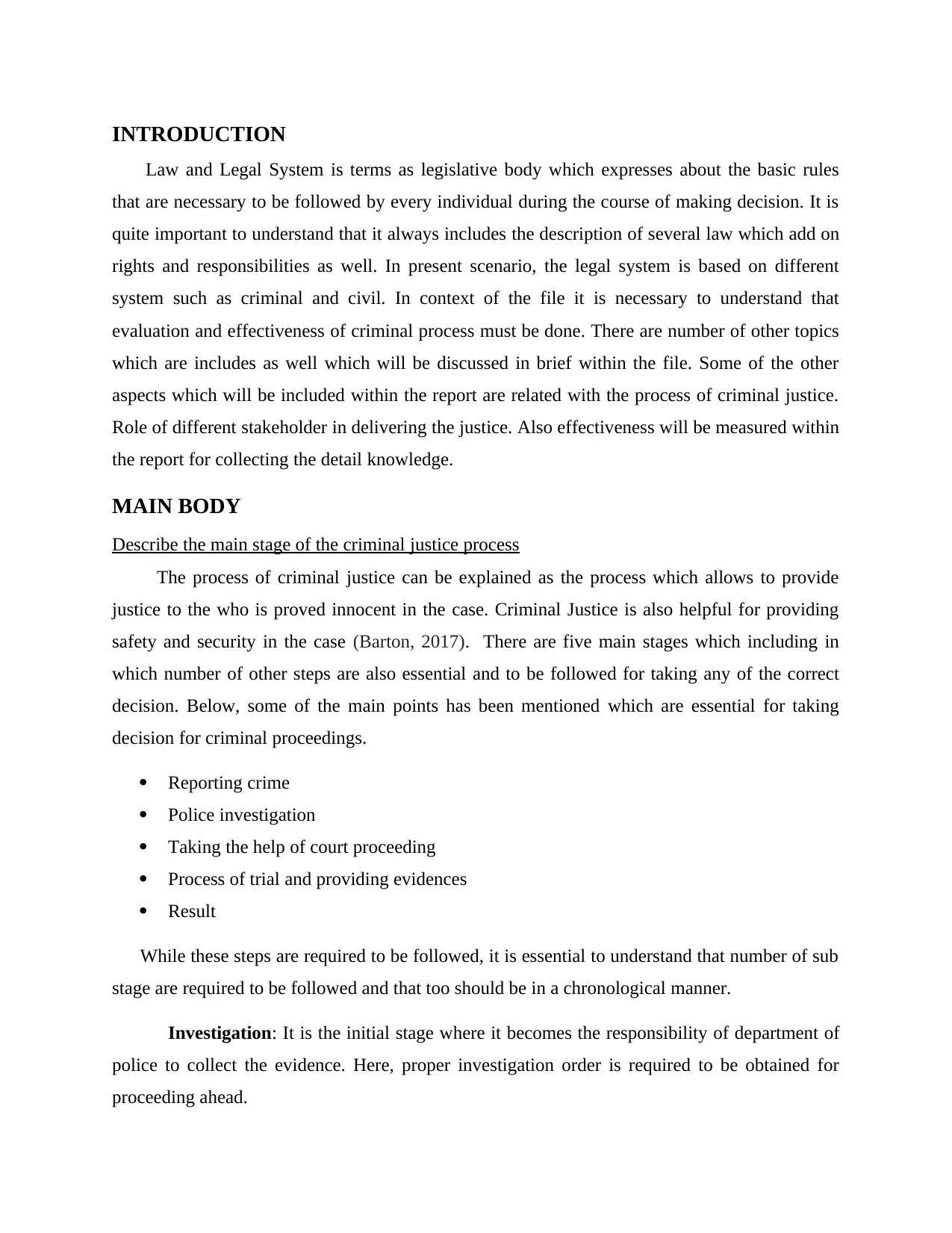
INTRODUCTION
Law and Legal System is terms as legislative body which expresses about the basic rules
that are necessary to be followed by every individual during the course of making decision. It is
quite important to understand that it always includes the description of several law which add on
rights and responsibilities as well. In present scenario, the legal system is based on different
system such as criminal and civil. In context of the file it is necessary to understand that
evaluation and effectiveness of criminal process must be done. There are number of other topics
which are includes as well which will be discussed in brief within the file. Some of the other
aspects which will be included within the report are related with the process of criminal justice.
Role of different stakeholder in delivering the justice. Also effectiveness will be measured within
the report for collecting the detail knowledge.
MAIN BODY
Describe the main stage of the criminal justice process
The process of criminal justice can be explained as the process which allows to provide
justice to the who is proved innocent in the case. Criminal Justice is also helpful for providing
safety and security in the case (Barton, 2017). There are five main stages which including in
which number of other steps are also essential and to be followed for taking any of the correct
decision. Below, some of the main points has been mentioned which are essential for taking
decision for criminal proceedings.
Reporting crime
Police investigation
Taking the help of court proceeding
Process of trial and providing evidences
Result
While these steps are required to be followed, it is essential to understand that number of sub
stage are required to be followed and that too should be in a chronological manner.
Investigation: It is the initial stage where it becomes the responsibility of department of
police to collect the evidence. Here, proper investigation order is required to be obtained for
proceeding ahead.
Law and Legal System is terms as legislative body which expresses about the basic rules
that are necessary to be followed by every individual during the course of making decision. It is
quite important to understand that it always includes the description of several law which add on
rights and responsibilities as well. In present scenario, the legal system is based on different
system such as criminal and civil. In context of the file it is necessary to understand that
evaluation and effectiveness of criminal process must be done. There are number of other topics
which are includes as well which will be discussed in brief within the file. Some of the other
aspects which will be included within the report are related with the process of criminal justice.
Role of different stakeholder in delivering the justice. Also effectiveness will be measured within
the report for collecting the detail knowledge.
MAIN BODY
Describe the main stage of the criminal justice process
The process of criminal justice can be explained as the process which allows to provide
justice to the who is proved innocent in the case. Criminal Justice is also helpful for providing
safety and security in the case (Barton, 2017). There are five main stages which including in
which number of other steps are also essential and to be followed for taking any of the correct
decision. Below, some of the main points has been mentioned which are essential for taking
decision for criminal proceedings.
Reporting crime
Police investigation
Taking the help of court proceeding
Process of trial and providing evidences
Result
While these steps are required to be followed, it is essential to understand that number of sub
stage are required to be followed and that too should be in a chronological manner.
Investigation: It is the initial stage where it becomes the responsibility of department of
police to collect the evidence. Here, proper investigation order is required to be obtained for
proceeding ahead.
⊘ This is a preview!⊘
Do you want full access?
Subscribe today to unlock all pages.

Trusted by 1+ million students worldwide
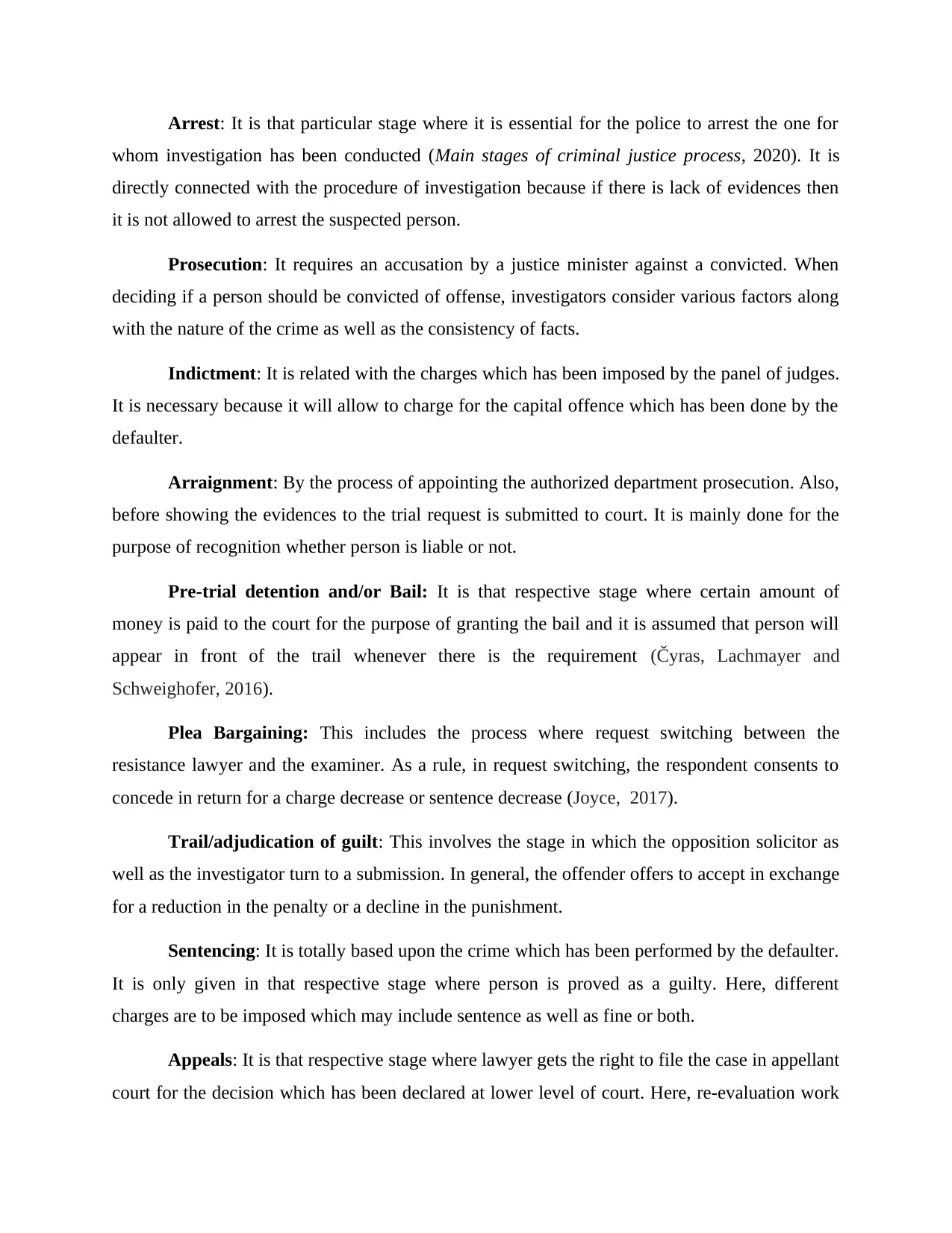
Arrest: It is that particular stage where it is essential for the police to arrest the one for
whom investigation has been conducted (Main stages of criminal justice process, 2020). It is
directly connected with the procedure of investigation because if there is lack of evidences then
it is not allowed to arrest the suspected person.
Prosecution: It requires an accusation by a justice minister against a convicted. When
deciding if a person should be convicted of offense, investigators consider various factors along
with the nature of the crime as well as the consistency of facts.
Indictment: It is related with the charges which has been imposed by the panel of judges.
It is necessary because it will allow to charge for the capital offence which has been done by the
defaulter.
Arraignment: By the process of appointing the authorized department prosecution. Also,
before showing the evidences to the trial request is submitted to court. It is mainly done for the
purpose of recognition whether person is liable or not.
Pre-trial detention and/or Bail: It is that respective stage where certain amount of
money is paid to the court for the purpose of granting the bail and it is assumed that person will
appear in front of the trail whenever there is the requirement (Čyras, Lachmayer and
Schweighofer, 2016).
Plea Bargaining: This includes the process where request switching between the
resistance lawyer and the examiner. As a rule, in request switching, the respondent consents to
concede in return for a charge decrease or sentence decrease (Joyce, 2017).
Trail/adjudication of guilt: This involves the stage in which the opposition solicitor as
well as the investigator turn to a submission. In general, the offender offers to accept in exchange
for a reduction in the penalty or a decline in the punishment.
Sentencing: It is totally based upon the crime which has been performed by the defaulter.
It is only given in that respective stage where person is proved as a guilty. Here, different
charges are to be imposed which may include sentence as well as fine or both.
Appeals: It is that respective stage where lawyer gets the right to file the case in appellant
court for the decision which has been declared at lower level of court. Here, re-evaluation work
whom investigation has been conducted (Main stages of criminal justice process, 2020). It is
directly connected with the procedure of investigation because if there is lack of evidences then
it is not allowed to arrest the suspected person.
Prosecution: It requires an accusation by a justice minister against a convicted. When
deciding if a person should be convicted of offense, investigators consider various factors along
with the nature of the crime as well as the consistency of facts.
Indictment: It is related with the charges which has been imposed by the panel of judges.
It is necessary because it will allow to charge for the capital offence which has been done by the
defaulter.
Arraignment: By the process of appointing the authorized department prosecution. Also,
before showing the evidences to the trial request is submitted to court. It is mainly done for the
purpose of recognition whether person is liable or not.
Pre-trial detention and/or Bail: It is that respective stage where certain amount of
money is paid to the court for the purpose of granting the bail and it is assumed that person will
appear in front of the trail whenever there is the requirement (Čyras, Lachmayer and
Schweighofer, 2016).
Plea Bargaining: This includes the process where request switching between the
resistance lawyer and the examiner. As a rule, in request switching, the respondent consents to
concede in return for a charge decrease or sentence decrease (Joyce, 2017).
Trail/adjudication of guilt: This involves the stage in which the opposition solicitor as
well as the investigator turn to a submission. In general, the offender offers to accept in exchange
for a reduction in the penalty or a decline in the punishment.
Sentencing: It is totally based upon the crime which has been performed by the defaulter.
It is only given in that respective stage where person is proved as a guilty. Here, different
charges are to be imposed which may include sentence as well as fine or both.
Appeals: It is that respective stage where lawyer gets the right to file the case in appellant
court for the decision which has been declared at lower level of court. Here, re-evaluation work
Paraphrase This Document
Need a fresh take? Get an instant paraphrase of this document with our AI Paraphraser
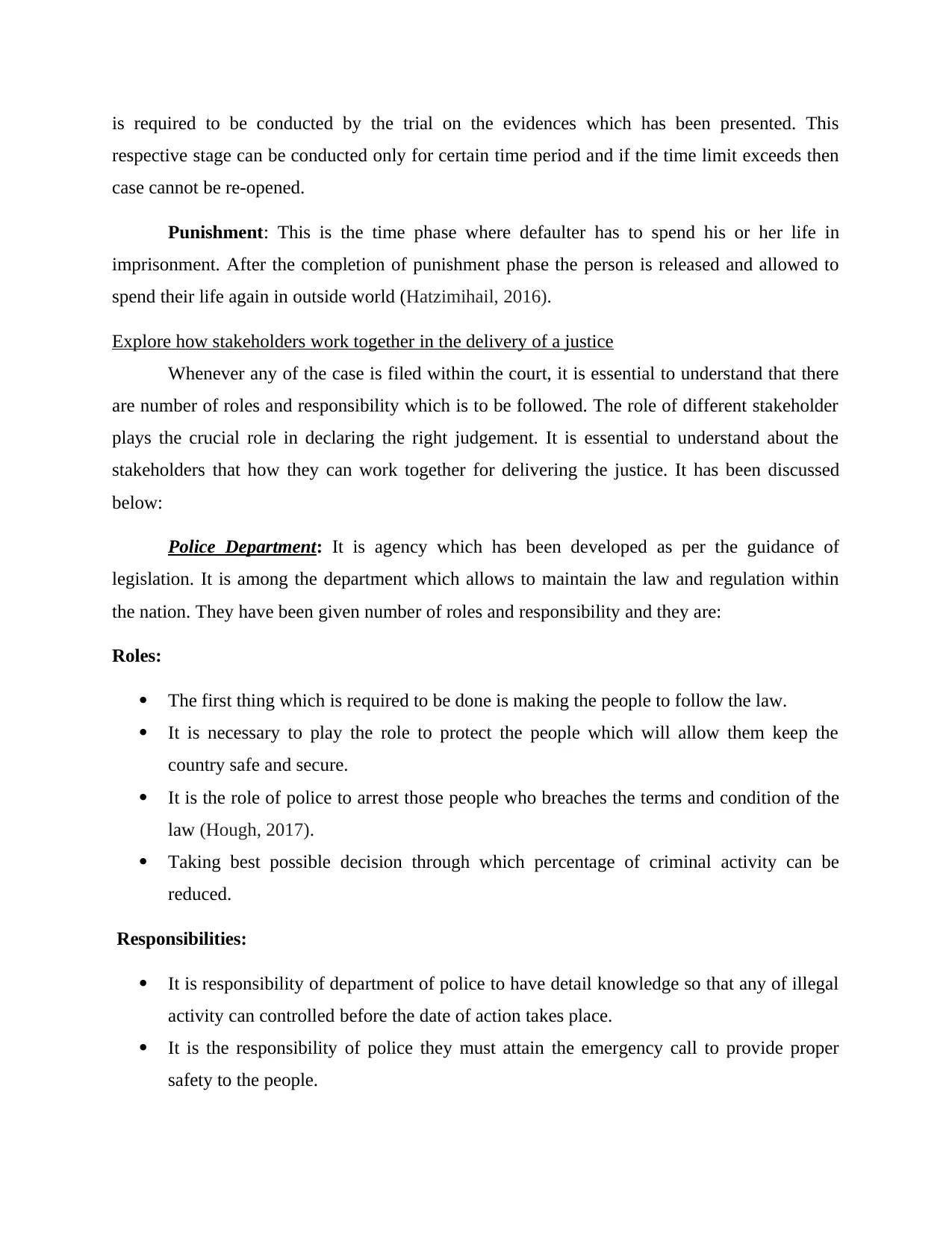
is required to be conducted by the trial on the evidences which has been presented. This
respective stage can be conducted only for certain time period and if the time limit exceeds then
case cannot be re-opened.
Punishment: This is the time phase where defaulter has to spend his or her life in
imprisonment. After the completion of punishment phase the person is released and allowed to
spend their life again in outside world (Hatzimihail, 2016).
Explore how stakeholders work together in the delivery of a justice
Whenever any of the case is filed within the court, it is essential to understand that there
are number of roles and responsibility which is to be followed. The role of different stakeholder
plays the crucial role in declaring the right judgement. It is essential to understand about the
stakeholders that how they can work together for delivering the justice. It has been discussed
below:
Police Department: It is agency which has been developed as per the guidance of
legislation. It is among the department which allows to maintain the law and regulation within
the nation. They have been given number of roles and responsibility and they are:
Roles:
The first thing which is required to be done is making the people to follow the law.
It is necessary to play the role to protect the people which will allow them keep the
country safe and secure.
It is the role of police to arrest those people who breaches the terms and condition of the
law (Hough, 2017).
Taking best possible decision through which percentage of criminal activity can be
reduced.
Responsibilities:
It is responsibility of department of police to have detail knowledge so that any of illegal
activity can controlled before the date of action takes place.
It is the responsibility of police they must attain the emergency call to provide proper
safety to the people.
respective stage can be conducted only for certain time period and if the time limit exceeds then
case cannot be re-opened.
Punishment: This is the time phase where defaulter has to spend his or her life in
imprisonment. After the completion of punishment phase the person is released and allowed to
spend their life again in outside world (Hatzimihail, 2016).
Explore how stakeholders work together in the delivery of a justice
Whenever any of the case is filed within the court, it is essential to understand that there
are number of roles and responsibility which is to be followed. The role of different stakeholder
plays the crucial role in declaring the right judgement. It is essential to understand about the
stakeholders that how they can work together for delivering the justice. It has been discussed
below:
Police Department: It is agency which has been developed as per the guidance of
legislation. It is among the department which allows to maintain the law and regulation within
the nation. They have been given number of roles and responsibility and they are:
Roles:
The first thing which is required to be done is making the people to follow the law.
It is necessary to play the role to protect the people which will allow them keep the
country safe and secure.
It is the role of police to arrest those people who breaches the terms and condition of the
law (Hough, 2017).
Taking best possible decision through which percentage of criminal activity can be
reduced.
Responsibilities:
It is responsibility of department of police to have detail knowledge so that any of illegal
activity can controlled before the date of action takes place.
It is the responsibility of police they must attain the emergency call to provide proper
safety to the people.
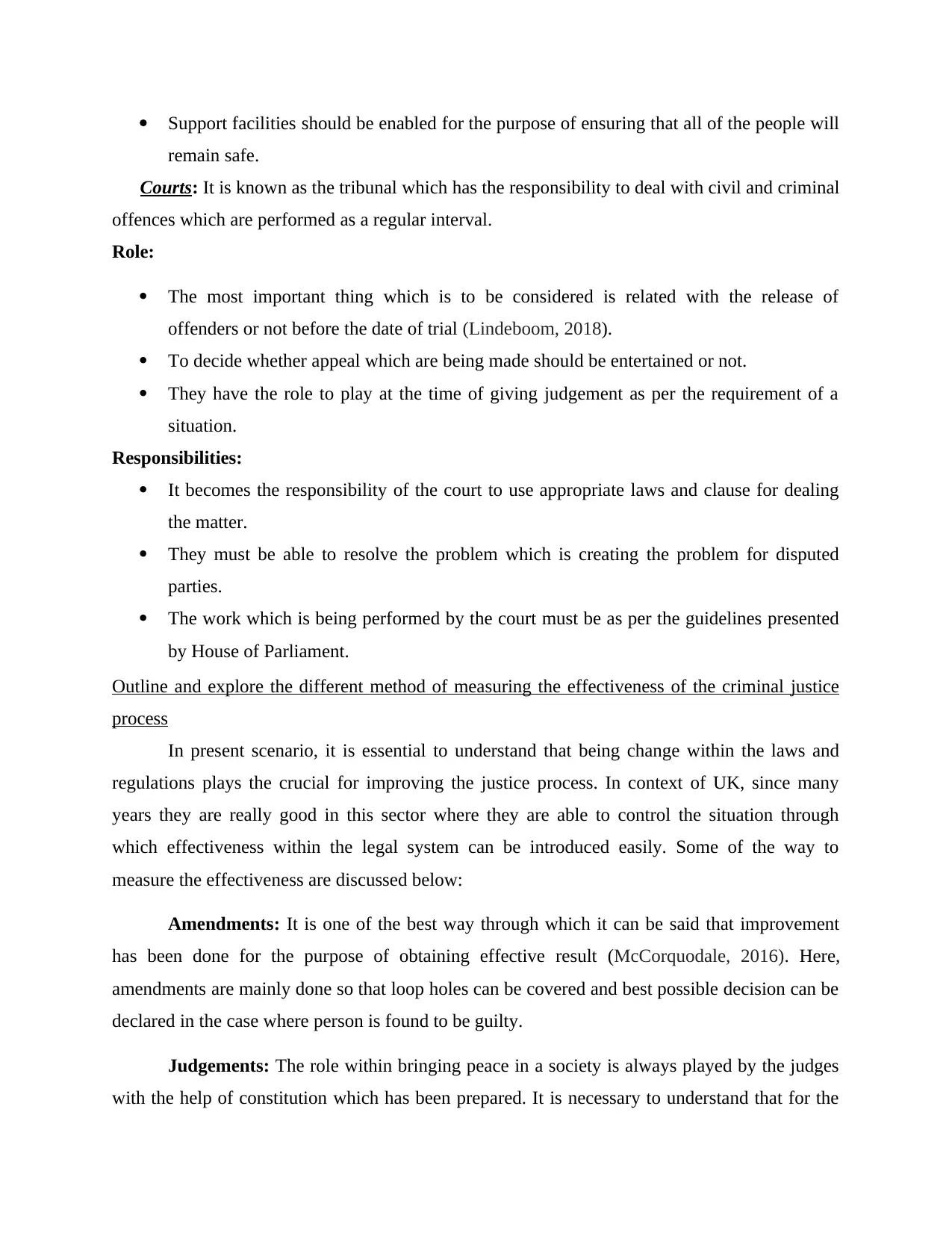
Support facilities should be enabled for the purpose of ensuring that all of the people will
remain safe.
Courts: It is known as the tribunal which has the responsibility to deal with civil and criminal
offences which are performed as a regular interval.
Role:
The most important thing which is to be considered is related with the release of
offenders or not before the date of trial (Lindeboom, 2018).
To decide whether appeal which are being made should be entertained or not.
They have the role to play at the time of giving judgement as per the requirement of a
situation.
Responsibilities:
It becomes the responsibility of the court to use appropriate laws and clause for dealing
the matter.
They must be able to resolve the problem which is creating the problem for disputed
parties.
The work which is being performed by the court must be as per the guidelines presented
by House of Parliament.
Outline and explore the different method of measuring the effectiveness of the criminal justice
process
In present scenario, it is essential to understand that being change within the laws and
regulations plays the crucial for improving the justice process. In context of UK, since many
years they are really good in this sector where they are able to control the situation through
which effectiveness within the legal system can be introduced easily. Some of the way to
measure the effectiveness are discussed below:
Amendments: It is one of the best way through which it can be said that improvement
has been done for the purpose of obtaining effective result (McCorquodale, 2016). Here,
amendments are mainly done so that loop holes can be covered and best possible decision can be
declared in the case where person is found to be guilty.
Judgements: The role within bringing peace in a society is always played by the judges
with the help of constitution which has been prepared. It is necessary to understand that for the
remain safe.
Courts: It is known as the tribunal which has the responsibility to deal with civil and criminal
offences which are performed as a regular interval.
Role:
The most important thing which is to be considered is related with the release of
offenders or not before the date of trial (Lindeboom, 2018).
To decide whether appeal which are being made should be entertained or not.
They have the role to play at the time of giving judgement as per the requirement of a
situation.
Responsibilities:
It becomes the responsibility of the court to use appropriate laws and clause for dealing
the matter.
They must be able to resolve the problem which is creating the problem for disputed
parties.
The work which is being performed by the court must be as per the guidelines presented
by House of Parliament.
Outline and explore the different method of measuring the effectiveness of the criminal justice
process
In present scenario, it is essential to understand that being change within the laws and
regulations plays the crucial for improving the justice process. In context of UK, since many
years they are really good in this sector where they are able to control the situation through
which effectiveness within the legal system can be introduced easily. Some of the way to
measure the effectiveness are discussed below:
Amendments: It is one of the best way through which it can be said that improvement
has been done for the purpose of obtaining effective result (McCorquodale, 2016). Here,
amendments are mainly done so that loop holes can be covered and best possible decision can be
declared in the case where person is found to be guilty.
Judgements: The role within bringing peace in a society is always played by the judges
with the help of constitution which has been prepared. It is necessary to understand that for the
⊘ This is a preview!⊘
Do you want full access?
Subscribe today to unlock all pages.

Trusted by 1+ million students worldwide
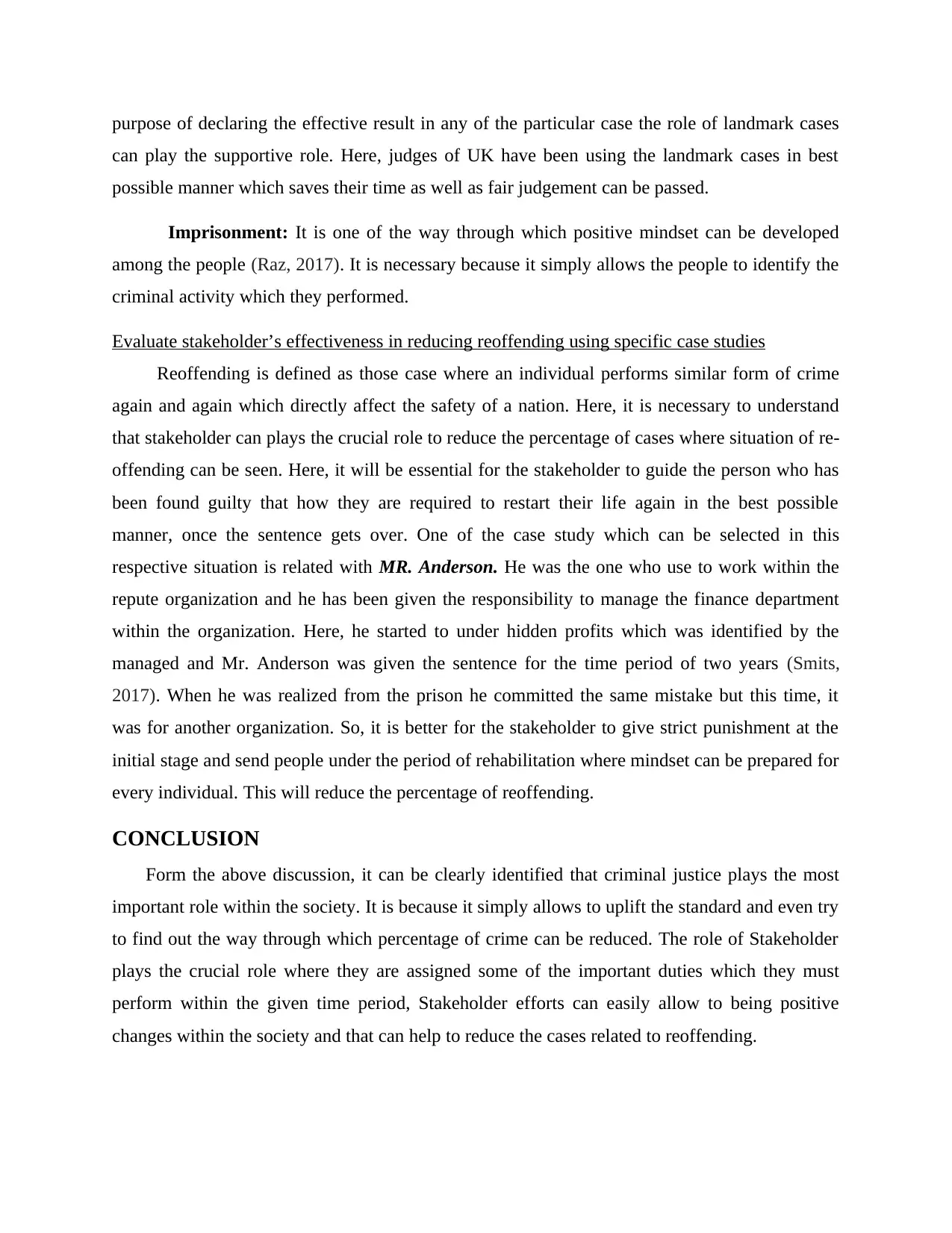
purpose of declaring the effective result in any of the particular case the role of landmark cases
can play the supportive role. Here, judges of UK have been using the landmark cases in best
possible manner which saves their time as well as fair judgement can be passed.
Imprisonment: It is one of the way through which positive mindset can be developed
among the people (Raz, 2017). It is necessary because it simply allows the people to identify the
criminal activity which they performed.
Evaluate stakeholder’s effectiveness in reducing reoffending using specific case studies
Reoffending is defined as those case where an individual performs similar form of crime
again and again which directly affect the safety of a nation. Here, it is necessary to understand
that stakeholder can plays the crucial role to reduce the percentage of cases where situation of re-
offending can be seen. Here, it will be essential for the stakeholder to guide the person who has
been found guilty that how they are required to restart their life again in the best possible
manner, once the sentence gets over. One of the case study which can be selected in this
respective situation is related with MR. Anderson. He was the one who use to work within the
repute organization and he has been given the responsibility to manage the finance department
within the organization. Here, he started to under hidden profits which was identified by the
managed and Mr. Anderson was given the sentence for the time period of two years (Smits,
2017). When he was realized from the prison he committed the same mistake but this time, it
was for another organization. So, it is better for the stakeholder to give strict punishment at the
initial stage and send people under the period of rehabilitation where mindset can be prepared for
every individual. This will reduce the percentage of reoffending.
CONCLUSION
Form the above discussion, it can be clearly identified that criminal justice plays the most
important role within the society. It is because it simply allows to uplift the standard and even try
to find out the way through which percentage of crime can be reduced. The role of Stakeholder
plays the crucial role where they are assigned some of the important duties which they must
perform within the given time period, Stakeholder efforts can easily allow to being positive
changes within the society and that can help to reduce the cases related to reoffending.
can play the supportive role. Here, judges of UK have been using the landmark cases in best
possible manner which saves their time as well as fair judgement can be passed.
Imprisonment: It is one of the way through which positive mindset can be developed
among the people (Raz, 2017). It is necessary because it simply allows the people to identify the
criminal activity which they performed.
Evaluate stakeholder’s effectiveness in reducing reoffending using specific case studies
Reoffending is defined as those case where an individual performs similar form of crime
again and again which directly affect the safety of a nation. Here, it is necessary to understand
that stakeholder can plays the crucial role to reduce the percentage of cases where situation of re-
offending can be seen. Here, it will be essential for the stakeholder to guide the person who has
been found guilty that how they are required to restart their life again in the best possible
manner, once the sentence gets over. One of the case study which can be selected in this
respective situation is related with MR. Anderson. He was the one who use to work within the
repute organization and he has been given the responsibility to manage the finance department
within the organization. Here, he started to under hidden profits which was identified by the
managed and Mr. Anderson was given the sentence for the time period of two years (Smits,
2017). When he was realized from the prison he committed the same mistake but this time, it
was for another organization. So, it is better for the stakeholder to give strict punishment at the
initial stage and send people under the period of rehabilitation where mindset can be prepared for
every individual. This will reduce the percentage of reoffending.
CONCLUSION
Form the above discussion, it can be clearly identified that criminal justice plays the most
important role within the society. It is because it simply allows to uplift the standard and even try
to find out the way through which percentage of crime can be reduced. The role of Stakeholder
plays the crucial role where they are assigned some of the important duties which they must
perform within the given time period, Stakeholder efforts can easily allow to being positive
changes within the society and that can help to reduce the cases related to reoffending.
Paraphrase This Document
Need a fresh take? Get an instant paraphrase of this document with our AI Paraphraser
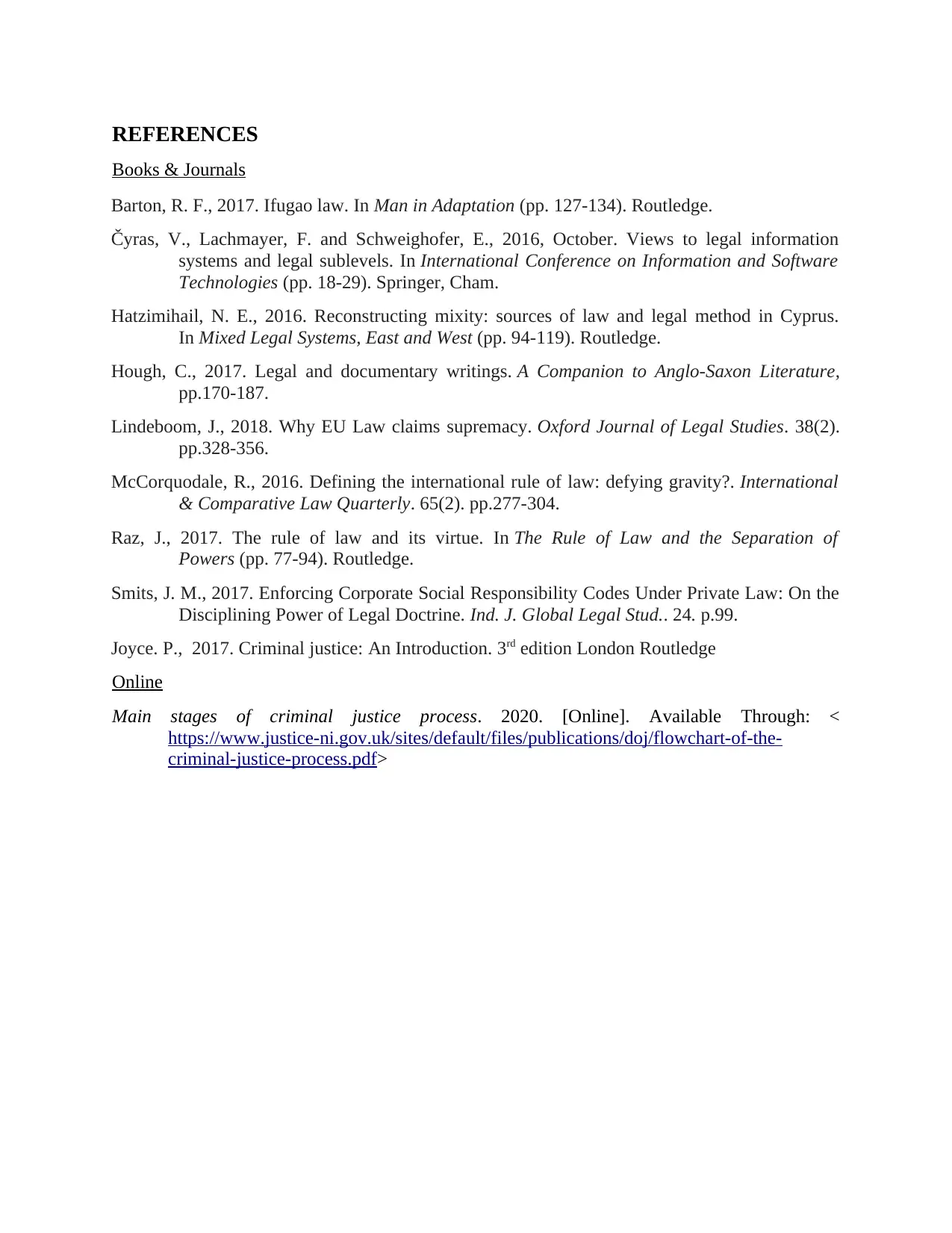
REFERENCES
Books & Journals
Barton, R. F., 2017. Ifugao law. In Man in Adaptation (pp. 127-134). Routledge.
Čyras, V., Lachmayer, F. and Schweighofer, E., 2016, October. Views to legal information
systems and legal sublevels. In International Conference on Information and Software
Technologies (pp. 18-29). Springer, Cham.
Hatzimihail, N. E., 2016. Reconstructing mixity: sources of law and legal method in Cyprus.
In Mixed Legal Systems, East and West (pp. 94-119). Routledge.
Hough, C., 2017. Legal and documentary writings. A Companion to Anglo‐Saxon Literature,
pp.170-187.
Lindeboom, J., 2018. Why EU Law claims supremacy. Oxford Journal of Legal Studies. 38(2).
pp.328-356.
McCorquodale, R., 2016. Defining the international rule of law: defying gravity?. International
& Comparative Law Quarterly. 65(2). pp.277-304.
Raz, J., 2017. The rule of law and its virtue. In The Rule of Law and the Separation of
Powers (pp. 77-94). Routledge.
Smits, J. M., 2017. Enforcing Corporate Social Responsibility Codes Under Private Law: On the
Disciplining Power of Legal Doctrine. Ind. J. Global Legal Stud.. 24. p.99.
Joyce. P., 2017. Criminal justice: An Introduction. 3rd edition London Routledge
Online
Main stages of criminal justice process. 2020. [Online]. Available Through: <
https://www.justice-ni.gov.uk/sites/default/files/publications/doj/flowchart-of-the-
criminal-justice-process.pdf>
Books & Journals
Barton, R. F., 2017. Ifugao law. In Man in Adaptation (pp. 127-134). Routledge.
Čyras, V., Lachmayer, F. and Schweighofer, E., 2016, October. Views to legal information
systems and legal sublevels. In International Conference on Information and Software
Technologies (pp. 18-29). Springer, Cham.
Hatzimihail, N. E., 2016. Reconstructing mixity: sources of law and legal method in Cyprus.
In Mixed Legal Systems, East and West (pp. 94-119). Routledge.
Hough, C., 2017. Legal and documentary writings. A Companion to Anglo‐Saxon Literature,
pp.170-187.
Lindeboom, J., 2018. Why EU Law claims supremacy. Oxford Journal of Legal Studies. 38(2).
pp.328-356.
McCorquodale, R., 2016. Defining the international rule of law: defying gravity?. International
& Comparative Law Quarterly. 65(2). pp.277-304.
Raz, J., 2017. The rule of law and its virtue. In The Rule of Law and the Separation of
Powers (pp. 77-94). Routledge.
Smits, J. M., 2017. Enforcing Corporate Social Responsibility Codes Under Private Law: On the
Disciplining Power of Legal Doctrine. Ind. J. Global Legal Stud.. 24. p.99.
Joyce. P., 2017. Criminal justice: An Introduction. 3rd edition London Routledge
Online
Main stages of criminal justice process. 2020. [Online]. Available Through: <
https://www.justice-ni.gov.uk/sites/default/files/publications/doj/flowchart-of-the-
criminal-justice-process.pdf>
1 out of 8
Related Documents
Your All-in-One AI-Powered Toolkit for Academic Success.
+13062052269
info@desklib.com
Available 24*7 on WhatsApp / Email
![[object Object]](/_next/static/media/star-bottom.7253800d.svg)
Unlock your academic potential
Copyright © 2020–2026 A2Z Services. All Rights Reserved. Developed and managed by ZUCOL.





